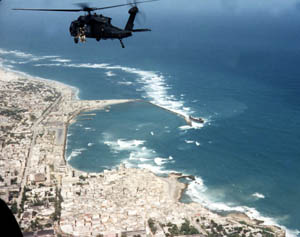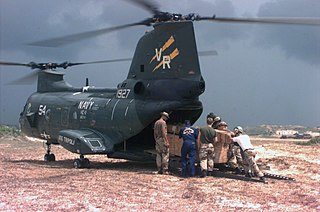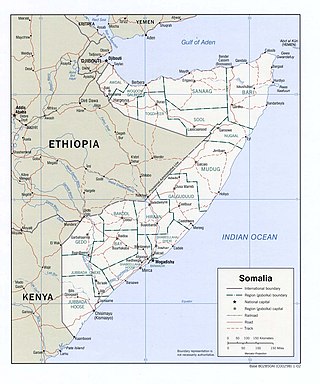
The Battle of Mogadishu, also known as the Black Hawk Down Incident, was part of Operation Gothic Serpent. It was fought on 3–4 October 1993, in Mogadishu, Somalia, between forces of the United States—supported by UNOSOM II—against the forces of the Somali National Alliance (SNA) and armed irregulars of south Mogadishu.

April Catherine Glaspie is an American former diplomat and senior member of the Foreign Service, best known for her role in the events leading up to the Gulf War.

Operation Gothic Serpent was a military operation conducted in Mogadishu, Somalia, by an American force code-named Task Force Ranger during the Somali Civil War in 1993. The primary objective of the operation was to capture Mohamed Farrah Aidid, leader of the Somali National Alliance who was wanted by the UNOSOM II in response to his attacks against United Nations troops. The operation took place from August to October 1993 and was led by US Joint Special Operations Command (JSOC).

The United Nations Operation in Somalia II was the second phase of the United Nations intervention in Somalia and took place from March 1993 until March 1995, following the outbreak of the Somali Civil War in 1991. UNOSOM II carried on from the transitory United States-controlled (UN-sanctioned) Unified Task Force (UNITAF), which had been preceded by UNOSOM I. Notably, UNOSOM II embarked on a nation-building mission, diverging from its predecessors. As delineated in UNSCR 814, the operation's objectives were to aid in relief provision and economic rehabilitation, foster political reconciliation, and re-establish political and civil administrations across Somalia.
Operation Provide Relief was a United States spearheaded humanitarian relief airlift that ran from August to December 1992 in response to the famine in Somalia. This effort was assisted by the United Nations Operation in Somalia I mission, in light of a severe food crisis initiated and exacerbated by ongoing factional fighting. However, there were significant obstructions to delivering relief aid due to the security situation. This prompted the UN to pass Resolution 794, which paved the way for the more robust, multinational Unified Task Force operation in December 1992.

Operation United Shield was the codename of a military operation, conducted 9 January to 3 March 1995, bringing a conclusion to the United Nations Operation in Somalia II. Commanded by the United States, two ships of the Pakistan Navy, five ships of the Italian Navy and six ships of the United States Navy formed a Combined Task Force (CTF) ensuring the safe evacuation of all UN Peacekeeping Forces from Somalia.

The Unified Task Force (UNITAF) was a United States-led, United Nations-sanctioned multinational force which operated in Somalia from 5 December 1992 until 4 May 1993. A United States initiative, UNITAF was charged with carrying out United Nations Security Council Resolution 794 to create a protected environment for conducting humanitarian operations in the southern half of the country.

United Nations Operation in Somalia I was the first part of a United Nations (UN) sponsored effort to provide, facilitate, and secure humanitarian relief in Somalia, as well as to monitor the first UN-brokered ceasefire of the Somali Civil War conflict in the early 1990s.

United Nations Security Council resolution 837, adopted unanimously on 6 June 1993, after reaffirming resolutions 733 (1992), 746 (1992), 751 (1992), 767 (1992), 775 (1992), 794 (1992) and 814 (1993), the Council condemned the attacks on the United Nations Operation in Somalia II in which 24 Pakistani troops were killed and 56 injured, including 1 Italian and 3 American soldiers.
Many factions opposed to Siad Barre set aside tribal and political differences to unite in purpose to overthrow his regime. After the collapse of Siad Barre's government in 1991 the nation fell into a long period of increasingly chaotic conflict between forces of clans, militias, warlords, separatist, religious functions and rebellion movements, other nations, and even the United Nations peacekeepers.

United Nations Security Council resolution 814, adopted unanimously on 26 March 1993, after reaffirming resolutions 733 (1992), 746 (1992), 751 (1992), 767 (1992), 775 (1992) and 794 (1993) on the ongoing civil war in Somalia, the council, acting under Chapter VII of the United Nations Charter, authorised an extension of the United Nations Operation in Somalia II until 31 October 1993.

United Nations Security Council resolution 865, adopted unanimously on 22 September 1993, after reaffirming resolutions 733 (1992), 746 (1992), 751 (1992), 767 (1992), 775 (1992), 794 (1992), 814 (1993) and 837 (1993), the Council addressed the process of national reconciliation and political settlement in Somalia, during the civil war.

United Nations Security Council resolution 878, adopted unanimously on 29 October 1993, after reaffirming resolutions 733 (1992), 746 (1992), 751 (1992), 767 (1992), 775 (1992), 794 (1992), 814 (1993), 837 (1993) and 865 (1993) on Somalia, the Council expressed its commitment to a future concerted strategy for the United Nations Operation in Somalia II and extended its mandate for an interim period until 18 November 1993.

United Nations Security Council resolution 885, adopted unanimously on 16 November 1993, after reaffirming resolutions 733 (1992), 746 (1992), 751 (1992), 767 (1992), 775 (1992), 794 (1992), 814 (1993), 837 (1993), 865 (1993) and 878 (1993) on Somalia and Resolution 868 (1993) on the safety of United Nations peacekeeping personnel, the council authorised the establishment of a Commission of Inquiry to investigate attacks on the United Nations Operation in Somalia II which led to casualties.

United Nations Security Council resolution 886, adopted unanimously on 18 November 1993, after reaffirming resolutions 733 (1992) and all of its subsequent resolutions on Somalia, the council discussed the situation in the country and renewed the mandate of the United Nations Operation in Somalia II until 31 May 1994.

United Nations Security Council resolution 897, adopted unanimously on 4 February 1994, after reaffirming resolutions 733 (1992) and 886 (1992) and all of its subsequent resolutions on Somalia, the Council discussed the role of the United Nations Operation in Somalia II in the peace process in the country.

United Nations Security Council resolution 923 was adopted unanimously on 31 May 1994. After reaffirming Resolution 733 (1992) and all of its subsequent resolutions on the situation in Somalia, the council addressed measures to resolve the situation and extended the mandate of the United Nations Operation in Somalia II until 30 September 1994.
United Nations Security Council resolution 946, adopted on 30 September 1994, after reaffirming Resolution 733 (1992) and all of its subsequent resolutions on the situation in Somalia, the council extended the mandate of the United Nations Operation in Somalia II for a period of one month until 31 October 1994.

United Nations Security Council resolution 954, adopted unanimously on 4 November 1994, after recalling Resolution 733 (1992) and all relevant resolutions on the situation in Somalia and a recent security council mission to the country, the Council noted the lack of progress in the peace process and decided, under Chapter VII of the United Nations Charter, to extend the mandate of the United Nations Operation in Somalia II for a final time, until 31 March 1995.
The June 5th 1993 attack on the Pakistani military was a major confrontation that occurred concurrently in different parts of the Somali capital of Mogadishu, between Somali citizens & militias against the Pakistani peacekeeping contingent of UNOSOM II.















